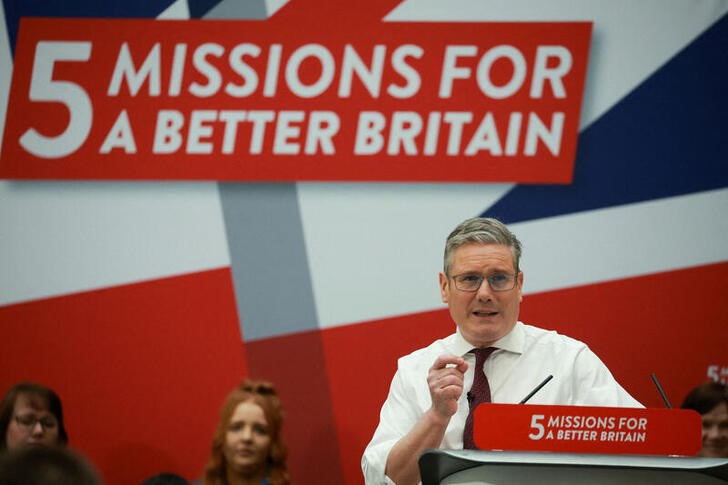 © Reuters. British leader of the Labour Party Keir Starmer speaks at the event in Manchester, Britain February 23, 2023. REUTERS/Phil Noble
© Reuters. British leader of the Labour Party Keir Starmer speaks at the event in Manchester, Britain February 23, 2023. REUTERS/Phil Noble
By William James and Andrew MacAskill
LONDON (Reuters) -Britain’s opposition Labour Party leader said on Monday he expects his party to back a new deal on post-Brexit trading arrangements for Northern Ireland, and he set out plans for the economy while warning that the country may soon be poorer than eastern European nations.
Prime Minister Rishi Sunak is expected to announce a new deal on post-Brexit trade rules for Northern Ireland on Monday after a meeting with visiting European Commission President Ursula von der Leyen.
Despite not having seen the details of the government’s deal to resolve tensions caused by the 2020 post-Brexit arrangements governing the British province, Labour leader Keir Starmer said any agreement would be an “improvement”.
Answering questions after a speech on the economy in central London, Starmer said he believed it is “almost inevitable” that the European Court of Justice will continue to play a role in governing any deal in Northern Ireland.
Asked if he would back the deal, Starmer said: “Yes. We haven’t seen the deal yet, but I’m completely across what the issues are and what the practical solutions are.
“Frankly, any step in those directions is going to be an improvement on what we’ve got, which is why I can say with confidence we expect to be able to back the deal.”
Setting out his battlelines for the next national election, expected in 2024, Starmer last week promised to ensure Britain has the fastest growing economy among the G7 on a sustained basis if it wins power.
Britain’s economy narrowly avoided recession in late 2022 but faces a difficult 2023 as the effects of double-digit inflation hit households.
Labour published an analysis showing a measure of living standards in Britain could fall behind that of Poland by 2030 and eventually Hungary and Romania without changes to policy.
The party said that, based on average 0.5% annual growth between 2010 and 2021 in Britain, that figure would fall behind Poland’s per capita GDP by 2030 if Poland kept up its 3.6% average annual growth.
The comparison was based on purchasing power parity, a measure that takes into account what money can buy in different countries and usually shows narrower differences than in unadjusted comparisons.
Poland, a former communist state, has experienced rapid growth since joining the European Union in 2004, in part thanks to the injection of hundreds of billions of euros worth of development funding from the bloc. Like Britain, it is experiencing high inflation and an expected slowdown.
Labour did not respond to a request for details on who had conducted the analysis.
Using the same analysis, the party said that by 2040, Britain on its current trajectory would fall $12,000 per person behind Romania and $8,000 per person behind Hungary, providing they also remained on the same trajectory.









